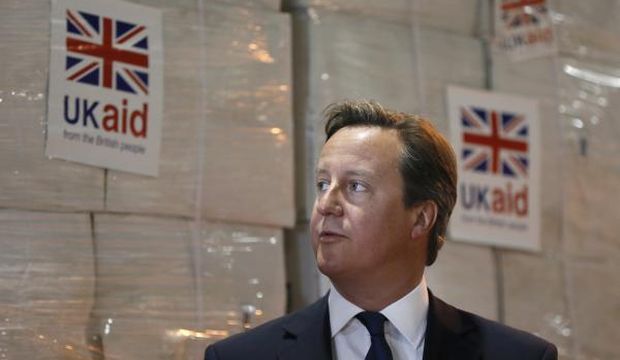
Britain’s Prime Minister David Cameron visits a UK Aid Disaster Response Center where humanitarian supplies are being collected to be airlifted to Iraq at Cotswold Airport near the village of Kemble, Gloucestershire, southern England, on August 14, 2014. (AFP Photo/Pool/Stefan Wermuth)
London, Asharq Al-Awsat—British Prime Minister David Cameron restated his belief that the UK should expand its role in Iraq on Monday, but said it would stop short of “boots on the ground.”
Meanwhile, speaking at a Royal Air Force base in Cyprus, Minister of Defense Michael Fallon said the RAF’s mission in Iraq could last “months,” and had already gone beyond its original humanitarian mission.
Fallon confirmed earlier reports that the UK had deployed a spy plane to the region, together with eight Tornado bombers equipped for reconnaissance missions, for gathering intelligence on the Islamic State of Iraq and Syria (ISIS).
“There may well now be in the next few weeks and months other ways that we may need to help save [lives and] protect people, and we are going to need all of you again and the surveillance you are able to give us,” the minister told RAF personnel.
Fallon also said that a number of helicopters had been placed on standby to help evacuate members of Iraq’s Yazidi minority displaced by ISIS, thousands of whom have fled their homes on the plains of Iraq’s northern Nineveh province.
While the overall British contribution is small, it raises the prospect that intelligence gathered by British aircraft could be used on the battlefield by Kurdish and Iraqi troops.
RAF intelligence is also likely to be shared with US forces, who have been conducting airstrikes against ISIS using manned and unmanned aircraft for more than a week.
Speaking on BBC television on Monday, Cameron called ISIS a “monstrous organization,” and said that the UK government would “look favorably” on requests for arms from Kurdish fighters battling the organization.
However, he added: “Britain is not going to get involved in another war in Iraq. We are not going to be putting boots on the ground. We are not going to be sending in the British army.”
Cameron’s comments follow statements of support for Iraq’s Kurdistan Regional Government (KRG) from other European leaders, who have pledged to offer military assistance to the autonomous region in its efforts to combat ISIS.
Earlier this month, the European Union cleared the way for individual member states to supply arms and ammunition to the KRG’s forces, if given permission by Baghdad.
France said it had already begun sending weapons to Kurdish fighters via Erbil, while the UK has shipped weapons similar to those already in use by Kurdish fighters from the former Soviet bloc, to Erbil.
